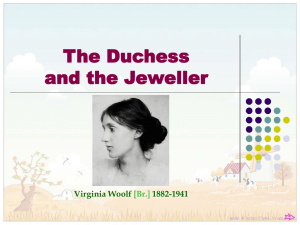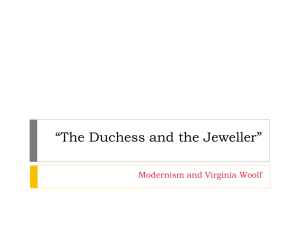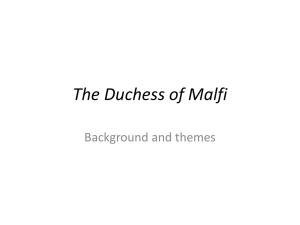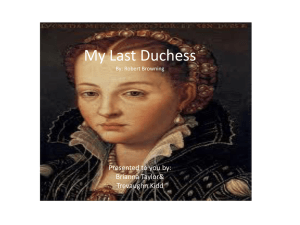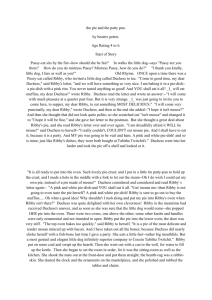CARIOLA!!!!
advertisement
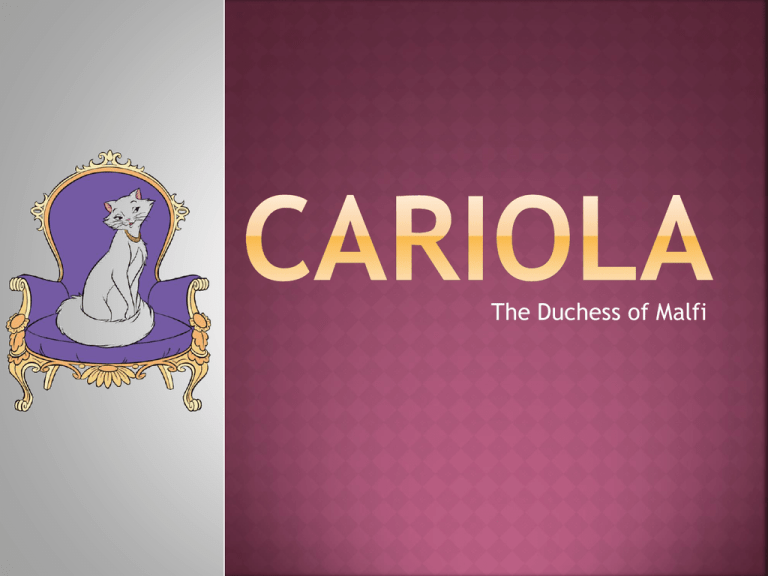
The Duchess of Malfi “Cariola” meaning trundle-bed in Italian, a play on the word carriolo. A pair of beds, one tucking in under the other. Could signify how close she is to Duchess – physically sleeping in her bedchambers, knowing all her secrets, but does not share her rank or authority (thus sleeping literally lower than her) Cariola is a minor character – serves to contrast/compare against other characters and heighten their personalities, rather than stand out as a notable one of her own. Duchess: Cariola is her constant support, witnessed her marriage, the only one who knows about Antonio from the very beginning, delivered her children, and in the end died (albeit unwillingly) for her. Represents hope; we see through Cariola’s constant dedication to Duchy, true friendship. She goes beyond being just a waiting-woman, she truly cares for Duchy’s wellbeing. Antonio: Cariola’s friendly attitude towards Antonio tells us he treats Duchy like a honourable man should and is in general just an awesome person, which makes for even more sympathy from the audience when Ferdy decides to be mean to him First appears in Act I, Scene i Cariola brings Antonio to the Duchess ‘[aside to Antonio] You must attend my lady in the gallery/ Some half hour hence’ L. 205 Spying is a re-occuring theme throughout the Duchess of Malfi and is especially associated with Ferdinand. Yet, ironically, the first to employ spying as a tactic is The Duchess. Cariola leaves Antonio and The Duchess to play their scene apparently alone, but in fact by the Duchess’ direction observes and overhears them from concealment; hiding behind wall tapestries DUCHESS [to Cariola]: Good dear soul,/ Leave me; but place thyself behind the arras,/ Where thou may'st overhear us. Act I scene ii, Cariola is the witness at the private wedding ceremony which legally binds the Duchess to Antonio. Act II scene ii, she also deliver’s The Duchess’ children ‘Sir you are the happy father of a son’ 81 Act III scene ii, In The Duchess’s bedchamber, Cariola and Antonio exchange a light-hearted, sweet moment of conversation about the point of lovers just sleeping together. Act III scene v, The newly banished family, and the maid Coriola, enter Loreto. Act IV Scene ii, Lets the madmen through and tries to comfort and calm The Duchess when she is in prison. Cariola acts on her loyalty and friendship to her mistress, with ‘I will die with her.’ Her final actions are those of someone scared, as she fights for release, making up all excuses possible ‘I am contracted to a young gentleman’ ‘I am quick with child’. These actions highlight human characteristics with which we can identify with. Early on, Webster conveys Cariola as a loyal, dutiful and true waiting woman to the Duchess through their intimate relationship and interactions. She has proved that she is trustworthy because The Duchess is confidant in confiding in Cariola her deepst secrets. DUCHESS: ‘Cariola,/ To thy known secrecy I have given up/ More than my life--my fame. 342 CARIOLA: Both shall be safe:/ For I'll conceal this secret from the world,/ As warily as those that trade in poison/ Keep poison from their children. Cariola’s reply illustrates that she is earthed and vigilant; in whatever the circumstance she will be steadfast by The Duchess. After hearing the exchange between The Duchess and Antonio Cariola remains alone on stage, which gives added force to her anxious assertion that her mistress is showing a fearful madness. It also conveys to the audience that she is a woman of compassion and caring. CARIOLA: Whether the spirit of greatness, or of woman Reign most in her, I know not; but it shows A fearful madness: I owe her much of pity. 492 Act III scene ii, the audience is exposed to a different side of her personality. In The Duchess’s bedchamber, Cariola and Antonio are caught in the sweet, carefree moment, happily teasing about the point of lovers just sleeping together. CARIOLA: For she's the sprawlingest bedfellow. ANTONIO: I shall like her the better for that. ANTONIO: Nay, that's but one; Venus had two soft doves To draw her chariot; I must have another. [kisses her] When wilt thou marry, Cariola? CARIOLA: Never, my lord. CARIOLA: This is vain poetry; but I pray you tell me, If there were propos'd me, wisdom, riches, and beauty, In three several young men, which should I choose? Act III scene ii, the audience is exposed to a different side of her personality. In The Duchess’s bedchamber, Cariola and Antonio are caught in the sweet, carefree moment, happily teasing about the point of lovers just sleeping together. CARIOLA: For she's the sprawlingest bedfellow. ANTONIO: I shall like her the better for that. ANTONIO: Nay, that's but one; Venus had two soft doves To draw her chariot; I must have another. [kisses her] When wilt thou marry, Cariola? CARIOLA: Never, my lord. CARIOLA: This is vain poetry; but I pray you tell me, If there were propos'd me, wisdom, riches, and beauty, In three several young men, which should I choose? Starkly contrasting to the later scenes, this one is the only truly happy scene where The Duchess and Antonio are in love and free of worries. Caught in the moment, Cariola’s light-hearted, humorous personality flourishes as she shares a friendship with Antonio through The Duchess. Act IV scene ii, The Duchess and her maid, Cariola, come back, distracted by the noises being made by a group of madmen and lets in several of the madmen. At this point we see that Cariola retains an optimistic point of view, acting strong for the Duchess and hoping that her mistress will get better. ‘but you shall live/ To shake this durance off’ This is also the final scene in which we see Cariola before her death. Even in the mist of Death and violence, Cariola remains loyal to her Duchess. She will stand by her no matter what as Cariola vows ‘I will die with her’ However just before execution Cariola cries for release, ‘You are deceived, Sir,/ I am not prepared for’t! I will not die!’ This show of final cowardice does not hinder Cariola’s worthy characteristics; she has remained loyal to the Duchess to the end. Cariola’s final pleas merely show that she is human, frightened of what everyone else is frightened of. Her actions highlight the realistic qualities we can identify with. Cariola doesn’t show significant change until the very end of the play where she and the Duchess are both to be executed. While the Duchess is still alive, she still shows utmost loyalty, by calling for help “What will you do with my lady? Call for help!” and when she sees it is useless, accepts her fate: “I will die for her” However as soon as the Duchess is dead, she changes her mind and uses excuse after excuse to get out of it: “I will not die, I must not, I am contracted to a young gentlemen!” “If you kill me now, I am damned! I have not been at confession this two years.” “I am quick with child.” We are left pondering if this is a betrayal to Duchess, or simply human, mad hysteria that is to be expected when facing death. Either way, this extremely quick change in Cariola’s fair and loyal personality (which we had seen and gotten to know for the whole of the play) compares and heightens just how grand and accepting the Duchess is of her fate. Cariola does not speak in large paragraphs, moreso, she serves as an insert between main characters. She does not use vivid/disturbing/mind-altering imagery when she speaks as she is always seen with the Duchess, and backs up what she says. As seen in Act 3 Scene 2, when Cariola is with Antonio and the Duchess, the main dialogue is between the lovers and Cariola does not have a main part. “When wilt thou marry, Cariola” “Never, my lord.” She speaks with obedience; she knows her place and her few words speak it. At the very end, while the Duchess remains calm, she starts to panic and her words show it. “Oh my sweet lady. .. Hence villains, tyrants, murderers! Alas!” She speaks dramatically.
